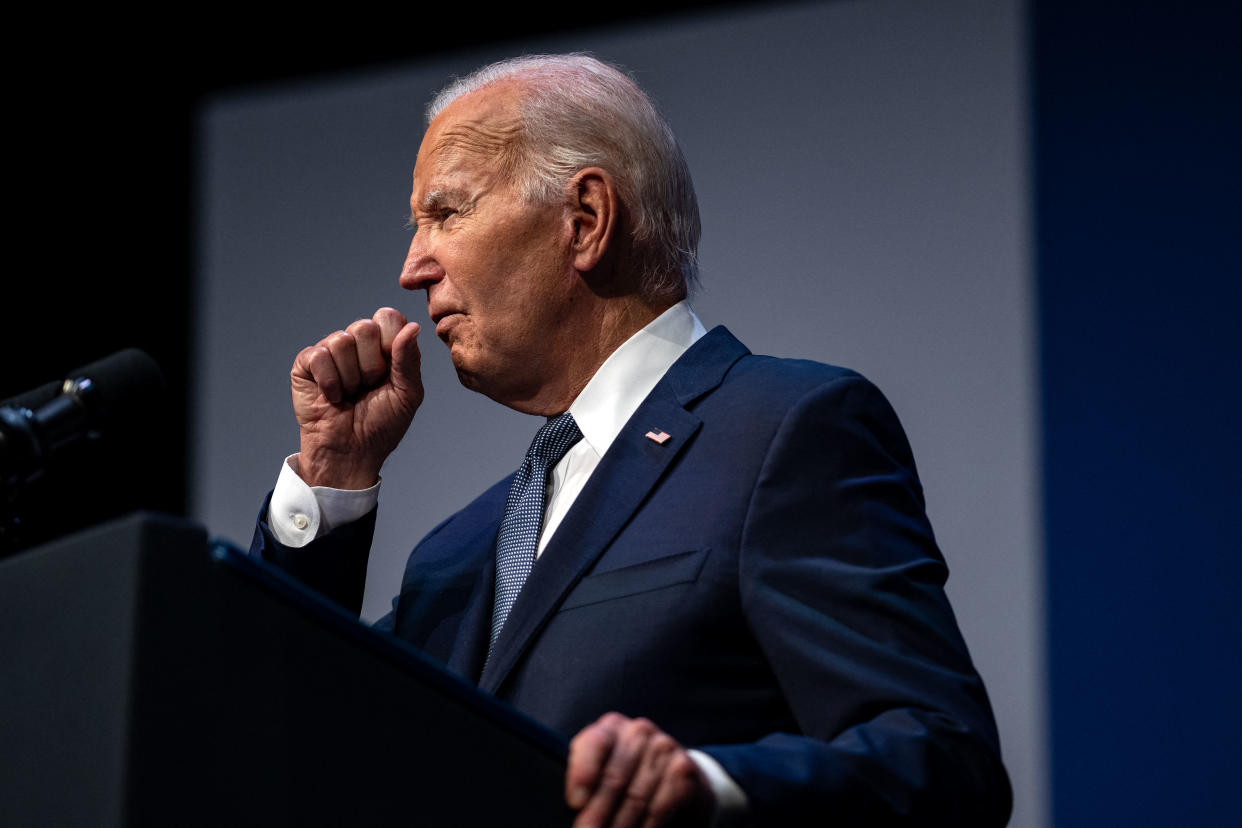Biden tests positive for COVID, mpox is mutating and 988 crisis lifeline turns 2: What to know about this week's health stories

Hey, Yahoo readers. Rebecca here — filling in for Kaitlin and sharing the latest and greatest in health and wellness news.
Here’s what our team worked on this week:
Amelia Edelman digs into some of the reasons why extreme heat can affect our moods.
Korin Miller shows us how to sleep better by squeezing in some quick exercise during the pre-bedtime Netflix binge.
Kerry Justich debunks a social media claim that you need antibacterial soap to combat that sweaty summer smell.
Natalie Rahhal tells us how to lower the risks of eating oysters, and Kaitlin Reilly answers some of our most pressing processed meat questions.
A piece by yours truly looks at whether it's still necessary to tell someone you have COVID.
And here’s what else the internet was buzzing about:
Biden has COVID — and he's not the only one
President Biden tested positive for COVID this week. Although the White House says he’s vaccinated and boosted and experiencing mild symptoms, experts say the 81-year-old’s age puts him at higher risk for complications from the virus. The president is self-isolating at his home in Rehoboth Beach, Del., and taking the antiviral medication Paxlovid.
What it means:
Biden’s diagnosis coincides with a surge in summertime COVID infections — a seasonal trend that we’ve grown accustomed to since the start of the pandemic — with a new variant known as KP.3 responsible for about a third of the cases in the U.S.
But while infections are on the rise, adherence to COVID-era etiquette has waned. During a few public appearances after his positive COVID test on Wednesday, the president did not mask up — which the Centers for Disease Control and Prevention says is an “additional strategy” for preventing disease spread, but no longer required when infected.
Mpox could be mutating to become more contagious
A new strain of mpox (formerly called “monkeypox”) could be spreading more easily between humans. Officials first became concerned about a more contagious version of the disease — which causes painful rashes and influenza-like symptoms and can be fatal in some cases — during an uptick in cases in the Democratic Republic of Congo in late June. So far this year there have been more than 11,000 cases and 445 deaths in the country, according to the World Health Organization (WHO).
What it means:
Mpox is usually transmitted through direct contact with the bodily fluids or sores of an infected person, and 91.4% of cases have been linked to sexual contact, according to WHO. But experts worry that this new strain appears to spread more easily.
Dr. Michael Ryan, executive director of WHO's Health Emergencies Programme, said it was a concern that public health officials don’t have “a complete understanding of the dynamics of community transmission at this time in the likes of Congo.”
However, the good news is that vaccines and antivirals are still effective at combating mpox, according to Dr. Amesh Adalja, an infectious disease expert and senior scholar at Johns Hopkins University Center for Health Security.
The 988 Suicide and Crisis Lifeline turns 2
Tuesday was the two-year anniversary of the 988 Suicide and Crisis Lifeline. Launched in July 2022, the lifeline connects anyone experiencing suicidal thoughts or mental health-related distress to crisis counselors 24/7 via call, text or chat.
“I’m proud to announce that 988 has answered more than 10 million contacts — that is 10 million times a person received confidential crisis care through phone, text or chat,” White House domestic policy adviser Neera Tanden touted at a press conference on Tuesday.
What it means:
Hannah Wesolowski, chief advocacy officer at the National Alliance on Mental Illness (NAMI), told NPR that “overall, I think it's doing great and it's saving lives.”
She notes that answer rates are high and that people's wait times to talk to a crisis counselor on the phone are down. But Wesolowski said that “there's still a fair amount of work to do to make sure everyone's needs are getting met.”
Since its inception, the Biden-Harris administration has invested $1.5 billion into 988 and its more than 200 call centers nationwide. Individual centers still rely heavily on state and local funding, so users' experiences can vary by state and even county.


